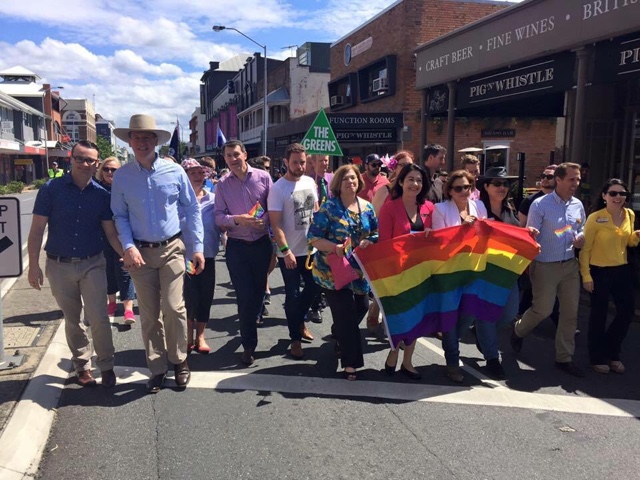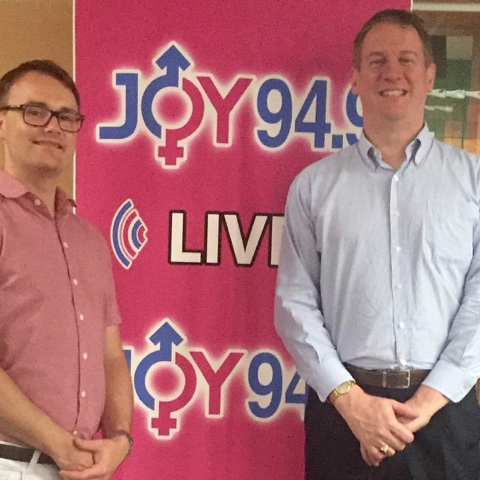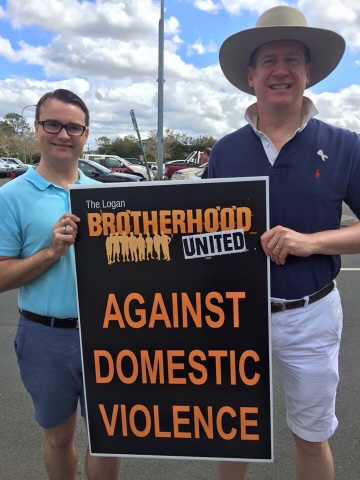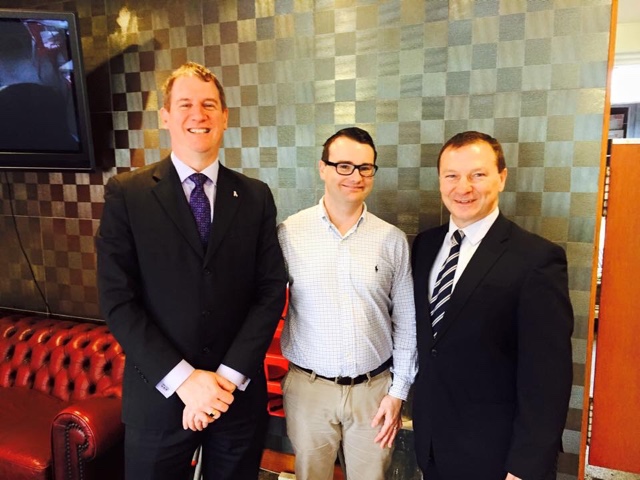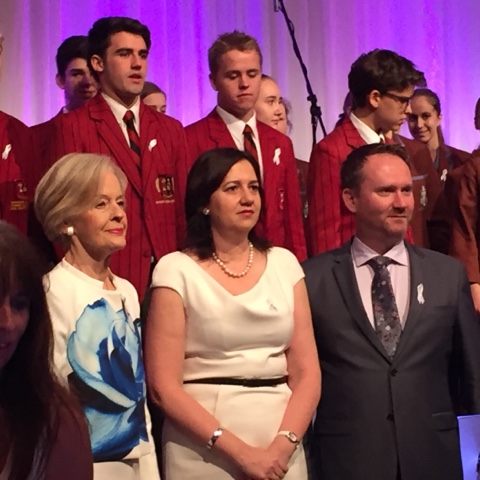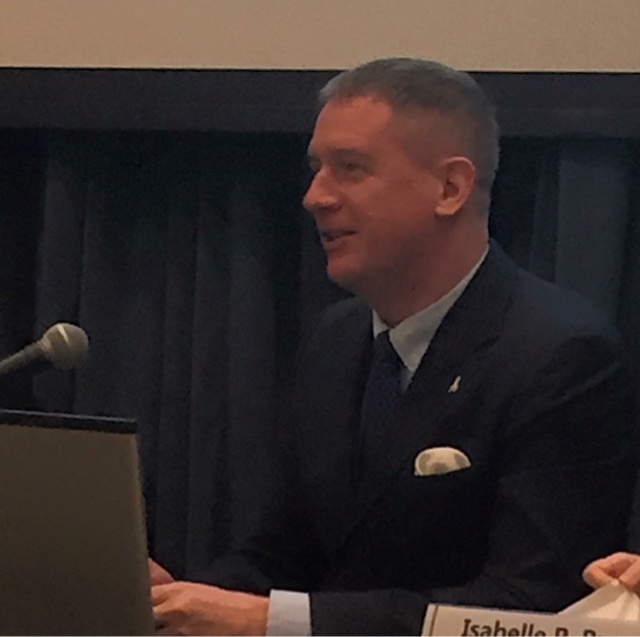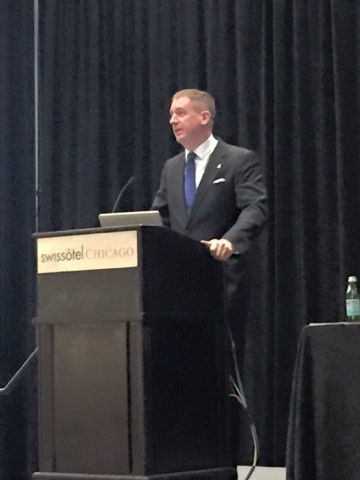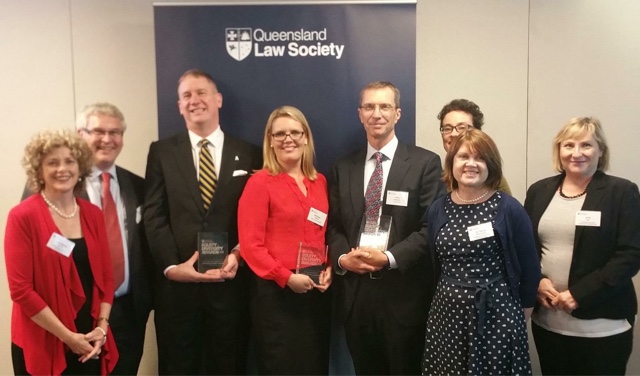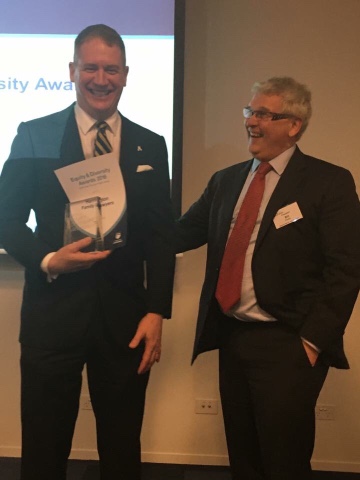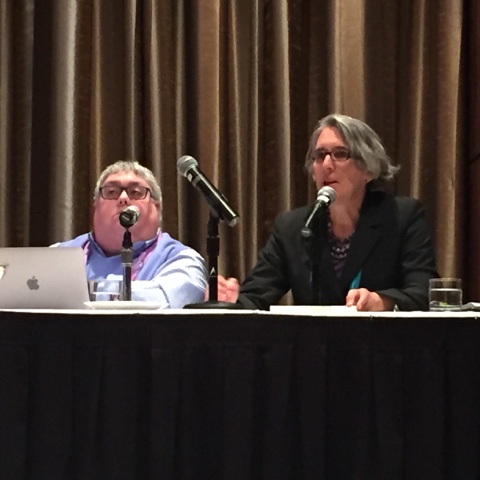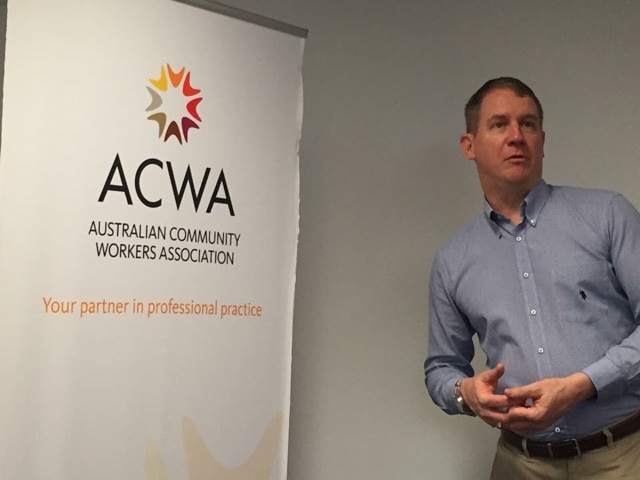What an extraordinary year it has been! Good luck to the nominees forLGBTIQ Activist of the Year
Good luck to the nominees for Activist of the Year
Last year I was humbled and honoured to be nominated for the Queen’s Ball LGBTIQ Activist of the Year. I was further honoured and humbled when I was chosen to be the LGBTIQ Activist of the Year.
In reflecting on the past year, I have the best wishes to whomever becomes Activist of the Year this year. There are many people who have fought and continue to fight for equality. Without this community effort the fight for equal rights will not succeed.
When I received the award, with my then fiance Mitchell beside me, I said that I wanted our laws to be changed so that Mitchell and I could marry, as could other couples. I also said that over 200 years ago, three words rang out about human rights- liberty, equality and fraternity. While we were free to meet at City Hall, and within the confines of the building we were all equal, as soon as we stepped out of the building, we were not. Same sex couples, for example, were not allowed to marry. Our democracy is based on the fundamental premise that all are equal under law. However, all are not equal under law, and therefore there was much to be done.
As Activist of the Year, I was privileged to be one of the leaders of the Pride march last year, in the biggest march ever. I also used my role to continue to lobby politicians for change, so that equality could be achieved, not just for marriage, but on a whole range of issues including family formation, gay panic defence, the recognition of our relationships, etc.
I got married
On a personal note, in October last year Mitchell and I decided we could wait no longer. We married – in Las Vegas. It is a modern marvel that in addition to the dozen people at the ceremony, there were about 250 around the world, in North America, Asia and Australia, watching our ceremony as it was streamed live.
The Marriage Act has not been changed, and we face delays until it is changed. In the meantime, Mitchell and I (and many other couples) face the odd situation that depending on where we are, we are either married or not. Since then we have travelled to the US (married), South Africa (married), Bahamas (not married) and home (not married).
I have been fortunate over the last year that I have had the active support of Mitchell, who also passionately believes in equality, and has often been there by my side or in support.
Holding hands
As I wrote yesterday, somehow Mitchell and I have been labelled “activists” because we love each other and walk through the streets of Brisbane and elsewhere holding hands. All too often we are subject to abuse because we openly show our affection for each other. I dream of a society where we can all be accepted for who we are, without any abuse, violence or threats of violence. Where we can be accepted as equals.
LGBTI Legal Service award
Receiving the Rainbow Keys Award from Drew Lauchland of the LGBTI Legal Service.
Last year I was humbled and honoured to receive the Rainbow Keys Award. This is an award handed out by the LGBTI Legal Service for 5 years continuous service as a volunteer. I had helped set up the service by persuading as many of my colleagues as possible to volunteer for the service, and was lucky enough to be rostered on the first night it opened- in July 2010. Regrettably, due to time commitments (and not for want of continuing there) I resigned as a volunteer in January this year.
This is what the LGBTI Legal Service said about me when I resigned from the service:
“It is with the sincerest regret the LGBTI Legal Service advises that Stephen Page is retiring from volunteering with the Service.
Stephen has been an integral participant in the Service. In fact, he was one of the original proponents and founding members of the Service. Those who were there in 2010 can remember Stephen bringing, on the first night of operation of the Service, a bottle of pink bubbles and a cake with pink icing. Unfortunately on that first night there were no clients, however the cake and champers were enjoyed by the volunteers.
Things have changed from that day. The service now provides legal advice for up to 10 clients per week. There can be no doubt that having Stephen as a volunteer lawyer has, over those years, enhanced the reputation of the Service, and he has regularly received glowing praise from clients and volunteers alike.
While we deeply regret losing Stephen’s participation in our volunteer programme, we wish to acknowledge and thank him for everything that he has contributed to the Service.
Stephen remains a leader in the field of family law, both nationally and internationally as an acclaimed expert on surrogacy, amongst a host of other skills. He remains heavily involved in furthering LGBTI rights in a range of fields.
To Stephen we give our heartfelt thanks. You were an inspiration in the establishment of our Service, and you consistently provided service above and beyond expectations. Thank you.
We also give our congratulations to you and Mitch on your marriage. It is unfortunate that it occurred in the USA and not Australia, but we are sure that you will continue to lobby for those rights in Australia.
Thanks again. The team at the LGBTI Legal Service.”
I am fortunate that in August I have the honour and the privilege, along with the Hon. Michael Kirby, to be speaking at the 6th anniversary of the service.
Goodbye to an old friend- Qnews
In January I also retired from writing for Qnews. I have written for Qnews since shortly after it started, and before that for BrotherSister. I guess this has been for 15 years or so. Issues covered have included gay marriage (of course) but also adoption, surrogacy, same sex domestic violence, refugee rights, and many others.
Writing the column has been a joy and a passion ever since I started, but one man can only do so much! Reluctantly, I gave it away.
Over the last 15 years, one of the topics I often wrote about was domestic violence. Here Mitch and I attended a rally in Logan saying we were opposed to domestic violence. We held hands while marching along Ewing Road, Woodridge.
420,000 lawyers can’t be wrong!
A card received from a friend, following the extraordinary outcomes with the American Bar Association and the Hague Conference on Private International Law.
Since 1992 I have fought for equality under law for LGBTIQ people. I have done so both as a lawyer for clients (including when I have acted as independent children’s lawyer, for the children), but also through lobbying anyone who would listen to effect change.
As part of that, since October 2011 I was given responsibility by the Chair of the Artificial Reproductive Treatment Committee of the American Bar Association, Mr Steve Snyder, to come up with a position paper of the American Bar Association as to a proposed Hague Convention concerning surrogacy. Since 2012 I have been one of two international representatives on that committee.
I am not American. I work in a small office in Brisbane. I was given this job because I was concerned that proposals about a convention would impact badly on Australian intended parents and as part of this I was concerned that the proposals could entrench discrimination against gay men in particular in their desire to have children. When Steve told me what was proposed with a convention; horrified, I set out my views in VERY clear language to him. Next thing you know, I got the job. I didn’t see that coming!
What I didn’t want was to have a convention that would wrap up intended parents in so much red tape, cost, delay and pain, like the adoption convention, that it would take forever to become parents. I didn’t want a convention that would be used as a fig leaf to prevent LGBTIQ people from having children.
With my co-author, Bruce Hale from Boston, I wrote a paper for the American Bar Association. I was in charge of the project. The paper soaked up thousands of hours of my and Bruce’s time, as well as those of other key lawyers, including Steve Snyder, and the current chair of the ART Committee, Rich Vaughn. It took a huge amount of effort, regular edits, and over four years for the paper to traverse the hills and dales of the world’s largest, richest and most powerful lawyer’s group- the American Bar Association.
In January I thought our proposal was sunk when we struck unexpected opposition. I was able to deal with that opposition head on.
And then, Eureka!– in February our paper was approved unopposed by the ABA’s House of Delegates as policy. It is now the policy, including as to it being non-discriminatory, of the 420,000 members of the ABA.
One week after the paper was announced, a working group of the various members nations of the Hague Conference on Private International Law (the body which writes Hague Conventions) met and adopted our fundamental policy. What was important was not so much the intended parents or the surrogate, but the legal status of the child that needed protection; a position I had come to in 2011.
And all this achieved from a little office in Brisbane!
Hosting an American colleague when he came to visit. Richard Vaughn chairs the American Bar Association’s Assisted Reproductive Treatment Committee.
Seeking non-discriminatory surrogacy laws
In March last year I was invited to give evidence to an informal Federal inquiry into our surrogacy laws. While I along with many others said that we ought to have properly regulated commercial surrogacy in Australia, the key message I gave was that we needed national surrogacy laws that were non-discriminatory. The Parliamentary Committee unanimously agreed with me on that point, and recommended a further, formal inquiry.
That recommendation for an inquiry fell on deaf ears. Tony Abbott was on the record as being opposed to an inquiry. Everyone I spoke to said that the idea of an inquiry was logjammed in his office.
Although I sought to push the inquiry with anyone who would listen, it was clear nothing was going to change until Abbott left.
As soon as he did so, I made representations to the following, to get an inquiry up and running:
- my local Member, Teresa Gambaro, who also headed the Joint Select Committee on Foreign Affairs and Defence
- Graham Perrett MP, a member of the committee
- Queensland Senator James McGrath, who was is also the Minister Assisting the Prime Minister
- through the peak family lawyers group, the Family Law Section of the Law Council of Australia
One of the politicians I lobbied was Graham Perrett MP.
The representations were successful. Late last year Attorney-General George Brandis announced a new inquiry. No sooner was it announced, but I was asked to make a submission, which I did. I called, again, for there to be national laws that were non-discriminatory.
After meeting with the Minister Assisting the Prime Minister, Queensland Senator James McGrath
The House of Representatives Committee has just now called, unanimously, for there to be national surrogacy laws that are non-discriminatory. It has proposed that these laws be drafted by the Australian Law Reform Commission, in conjunction with eminent jurists, in consultation with the Council of Australian Governments (COAG).
Currently there is discrimination in surrogacy laws in the ACT (must be a couple), Tasmania (everyone must come from there), SA (singles and same sex couples cannot access surrogacy, lesbian couples can access IVF only with difficulty, and single men and gay men cannot access IVF), the NT (not as to surrogacy- there are no laws which means it is not available, but as to IVF, because the doctors are SA licensed) and WA (single men and gay couples cannot access surrogacy). There is a lot to be done. In my own role, and as chair of the Surrogacy Australia legal committee, I will continue to push this issue so that discrimination can end, and so that those who want to be parents can be parents.
Another fighter for the LGBTI community- with Councillor Vicki Howard. I have lobbied her in the last year as well as Lord Mayor Graham Quirk.
Getting rid of LGBTIQ discrimination in South Australia
Last year when South Australia changed its surrogacy laws, I sought that it also remove its discrimination against same sex couples and singles. I was unsuccessful.
The Weatherill government decided that South Australia needed to junk its laws discriminating against LGBTIQ people, and set up an inquiry, to work out what laws were discriminatory, and what was the best model to change the law. I made submissions about the impact of SA’s discriminatory IVF and surrogacy laws. I then took part in a forum organised by the SA Law Reform Institute. The Institute has recommended that those discriminatory laws be repealed.
Getting rid of LGBTIQ discrimination in Queensland
A passion of mine for the last 31 years is to get rid of domestic violence. I was fortunate, as a White Ribbon Ambassador, to attend the White Ribbon Day breakfast, hosted by the Premier.
In the last year I have spoken to many politicians, their staffers and anyone else who would listen to get rid of our discriminatory laws. Not only marriage, but gay panic defence, civil partnerships, expungement of criminal convictions for gay offences, adoption, etc. Those I have lobbied have included Grace Grace, Communities Minister Shannon Fentiman and the office of Attorney-General Yvette D’Ath.
Over 16 years ago, Grace Grace and I first achieved law changes for LGBTI people. I continue to lobby her so that we can achieve equality.
I and 25 others took part in the LGBTIQ forum held by the Queensland Government to identify issues for the LGBTIQ community. The key message that I and others gave at the forum was that the number one issue was to change the law so that we are all equal.
I made submissions to the State Government review into adoption that the Adoption Act must be non-discriminatory.
The history making LGBT lawyers meeting
In March this year I hosted and organised the first meeting of family lawyers held in Australia who advocate for and act for LGBT clients. About 20 lawyers came to Brisbane from locally, interstate and the US to take part, under the auspices of the LGBT Family Law Institute. The Institute is a joint venture of the (US) National LGBT Bar Association and the (US) National Center for Lesbian Rights. The NCLR has been a key litigator in many of the equal rights cases in recent years, including taking part in the US Supreme Court decision last year that resulted in equal marriage rights in the US.
The meeting was the first meeting of the LGBT Family Law Institute outside the US and the UK. More significantly, it will be the first, hopefully of many, that by use of the skills of specialist lawyers, will advance the rights of LGBTIQ people in Australia.
The meeting was able to identify key issues for LGBTIQ people when they engage in family formation or splitting up, or even who they are as people.
When I announced that I would be holding the meeting, it inspired my Canadian friend and colleague to hold one there too.
Striving for LGBTIQ equality worldwide
In October last year, when in San Francisco, Mitchell and I visited friend and colleague Cathy Sakimura from the National Center for Lesbian Rights. I first visited there in 2006. The NCLR has been one of the key fighters to establish equality in the US, including in last year’s Supreme Court decision.
In March I was privileged to be the keynote speaker at the South African family law conference in Cape Town. The conference was inspiring because in countries where domestic violence and homophobia are rife, rather than wallow in despair, organisors are trying to change the world for the better- and slowly getting there. One of the things I emphasised was the need for equality for LGBTIQ people. I was astounded to hear a speaker from Ghana talk about her country’s proposed adoption laws- which in part were defective because they did not recognise LGBTIQ intended parents. It was refreshing to hear this criticism.
I presented to the Bar Association of San Francisco about international surrogacy issues, with an emphasis, not surprisingly, on the impact of laws on gay men.
The conference emphasised two universal truths- the first- while we have discrimination in this country, we have it pretty lucky. We do not have, for example, the death penalty for having anal sex. The second- human rights are universal. While we continue to struggle for equality at home, we should never forget those abroad who are in much worse shape than us.
While I was in South Africa, I scoped out the potential for there to be an LGBT Family Law Institute there. I met a number of lawyers there, and in my view hopefully there will also be an LGBT Family Law Institute there- which in turn will advance the rights of LGBTIQ people both in South Africa, and because of its leading role in the continent, throughout Africa.
Appointment to the Equalising Opportunities in the Law Committee
After our first meeting! With Linda Ryle, President of the Indigenous Lawyers Association of Queensland, after our first meeting of the Equalising Opportunities in the Law Committee.
Abroad again
Other people take holidays. I work. In September last year I spoke to the Family Law Practitioners Association of WA conference on a panel with two Family Court judges- about surrogacy. One of the messages I gave was that WA has to get rid of its discriminatory surrogacy laws.
The two international representatives together. Sara Cohen and I are the international representatives on the American Bar Association’s Assisted Reproductive Treatment Committee. Inspired by my organising the first LGBT Family Law Institute conference in Brisbane, Sara has organised the first ever LGBT Family Law Institute conference in Canada. Way to go!
When Mitchell and I married last year, it was during a whirlwind trip after I presented about surrogacy (including LGBTIQ issues) in San Francisco and Chicago. Not surprisingly, a key focus of the presentation in San Francisco was about how gay men achieve parenthood through surrogacy.
For 31 years I have passionately opposed domestic violence, and achieved legislative change, to help make women and children safer, as well as including LGBTI people under domestic violence laws. I am glad that my husband shares my passion. At a domestic violence rally last year, attended by most Queensland State MP’s.
Mitchell and I recently travelled to the US and the Bahamas, where I presented at family law/surrogacy conferences. I had the opportunity to meet colleagues from the US, Asia and Europe and discuss developments, in amongst other things, LGBTIQ rights, and the steps forward towards a Hague Convention about surrogacy and children’s status.
While in New York, we caught up with a friend and fellow activist, Gabriel Blau. Gabriel is an independent LGBTIQ activist, who previously headed up the Family Equality Council, and who raised US$18million to help set up New York’s first gay and lesbian synagogue.
Following the presentation where I criticised WA’s Surrogacy Act for being discriminatory against gay couples and single men. With fellow panelists Chief Justice Diana Bryant of the Family Court of Australia, Justice Jane Crisford of the Family Court of WA, and WA barrister Rachel Oakeley.
Presenting at the American Academy of Artificial Reproductive Technology Attorneys conference in Chicago last year.
Qld Law Society equity and diversity award
With Queensland Law Society President Bill Potts. Bill called me “hardworking” and “an ornament”.
On Thursday my firm received an award from the President of the Queensland Law Society, Bill Potts- for equity and diversity. The small firm practice initiative recognises our championing the rights of women and LGBTIQ people, including through this “inspirational” and “pioneering” blog. My aim in writing this blog was not to win awards, but to champion equality.
The launch of Rainbow Fertility
Some time ago I mentioned to the managing director of one of Australia’s national IVF clinics, City Fertility Centre, Mr Adnan Catakovic, that IVF clinics really did not recognise LGBTIQ clients, even though they represented a fair number of those seeking help from the clinics. IVF clinics seemed to be focussed on heterosexual couples.
In a month’s time I will be attending the launch of Rainbow Fertility– IVF services by City Fertility Centre devoted primarily to LGBTI clients. What a welcome initiative.
Inspiration from others
I continue to draw inspiration by amazing friends and colleagues, who are driving change here and overseas. Here are just a couple:
Irit Rosenblum continues to achieve change to enable Israelis to have children, despite a political process stacked against her.
Deb Guston and Deb Wald are two amazing colleagues in the US who have fought and lobbied for change for equal rights for many years, often in conjunction with the LGBT Family Law Institute and the National Center for Lesbian Rights.
Not resting on my laurels
One of 18 presentations I did last year. This year, I am up to 7 so far, with another 9 between now and September. At this presentation i talked about the courage to change: that someone who is determined to stand up for what they believe in can, with determination, and the assistance of others, achieve change.
I will not quit, while I have breath in my body, to try and ensure that we all have equality before the law. When I took my oath of office as a solicitor back in 1987, I was determined to achieve this, and am still determined to do so.
I was fortunate to speak at the marriage equality rally in front of a huge crowd. We are all entitled to equality, and should receive it.
I still do my work!
Some people think that because I am so active, that I can’t possibly do my work. Not so! For the last 31+ years I have had the great joy to be able to help real people achieve justice in their lives, by representing them when their relationships breakdown. I still love doing that work. Helping real people matters!
For many years now I have helped my clients achieve the dream of becoming parents through surrogacy and egg donation. I was honoured to help these families to become parents.
Amazing doctors like Dr Bruce Shapiro have achieved the magic of life. I am so lucky to be able to help people have children.
What I did before I became activist of the year
This is what I did before I became Activist of the Year. I have been busy! Again, I wish whomever becomes Activist of the Year this year my best wishes and congratulations. Your award is well deserved, no matter who you might be.

